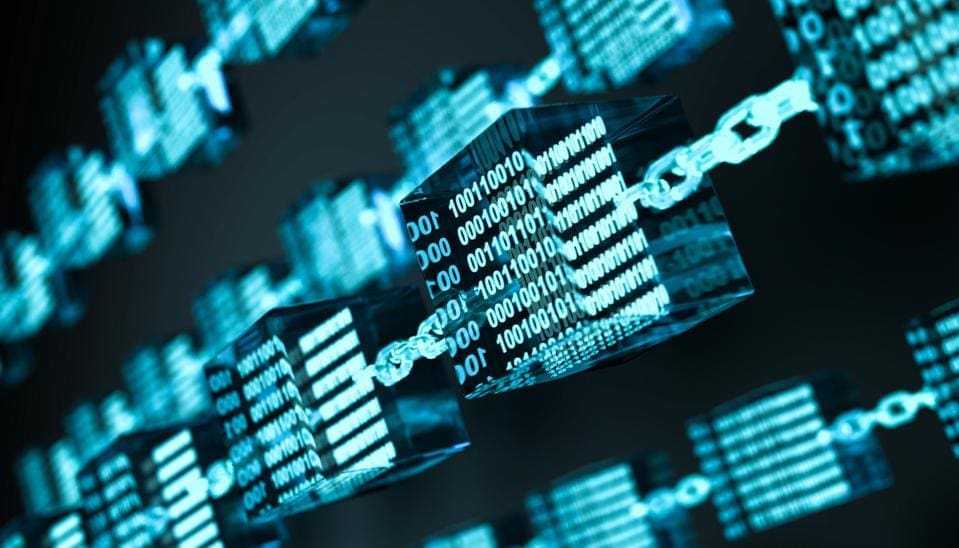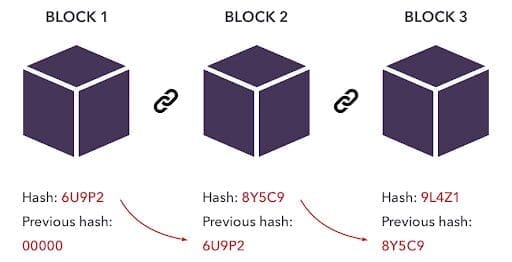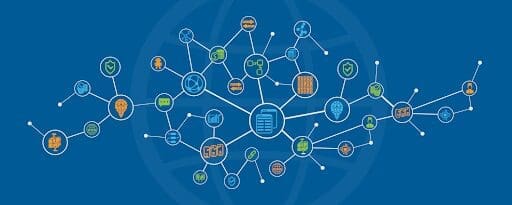
Blockchain is a hot topic in tech these days — you’ve probably heard it used mainly concerning Bitcoin and other cryptocurrencies. These technologies can impact our daily lives — so it’s worth understanding how they work. Blockchain is a system that records information that makes it difficult or impossible to change or hack the system. It’s a digital log of transactions that are duplicated and distributed across the entire network of computer systems.

Now, let’s take a close look at a single block. Each block has some data, the hash of the block, and the hash of the previous block. And that is how blocks are connected in a chain. Hash is like a fingerprint. It’s unique to every block and instrumental in detecting block changes. Before a block is to be added to the chain, a few things have to happen. Firstly, a cryptographic puzzle is to be solved, thus creating the block. The computer that creates the puzzle, shares the solution with all other computers on the network. This is known as proof-of-work. The network verifies the proof-of-work, and if correct, the block is added to the chain. This also makes it very hard to tamper with a block because if you tamper with one block, you’ll have to re-calculate the proof-of-work for all the following blocks. Maodong Xu says that creating complex puzzles and verification by the network ensures that we can trust every block on the chain. This way, we can also interact with our data in real-time.

Blockchains secure themselves by being distributed. Instead of a central entity, blockchain uses peer-to-peer networks to manage the chain and allow anyone to join. There are also numerous copies of the blockchain, and transactions are instantly registered across all chain copies, so everyone receives the same information simultaneously.
Following are the key features that make blockchain apt in various scenarios:
Immutability
Information in blockchain is “append-only,” which means you can only add to this long chain of information and nobody can erase it. Any alteration to the stored data will alarm the system.
Transparency
Another aspect that makes blockchain so crucial is transparency. Public blockchain provides transparency and is very useful for our society’s different functions, including elections. Companies also utilize it to ensure that users interact with full or partial transparency.
Digital Freedom
Blockchain lets you be your own bank. You can withdraw money whenever you want, without anyone else’s authorization. Without any central authority, you are the sole owner responsible for your assets.
Decentralized Services
These services give people unprecedented access to options currently unavailable in the market, like asset or energy management.
Better Security
Blockchain uses cryptography to add security to the data stored on the network. On top of the cryptography, the decentralization feature makes blockchain provide better security than other systems. Cryptography utilizes complex mathematical algorithms to secure the data and systems on the blockchain network.
Inexpensive
No centralization means there is no need to pay an intermediary, thus improving cost efficiency. In the supply chain, using blockchain reduces paperwork. The paperwork costs a lot, including hiring people to do the paperwork and maintaining the intermediaries.
Improved Efficiency
The cause for improved efficiency is better security, removal of intermediaries, and overall better processes. Transactions also take seconds instead of a week, especially the international ones.
Let’s try to understand blockchain from a business perspective. Firstly, it reduces operational costs. The removal of intermediaries is a boon as it reduces cost and the point of contact, improving efficiency and growth. Transaction speeds have improved to a new height. It is all about efficiency for businesses if they can keep their accuracy intact. Some companies have already worked with blockchain. For instance, Dubai Blockchain Strategy wants to power their city with blockchain. They are aiming at 2020 to implement it.
However, blockchain maturity is a significant concern. Blockchain is a pretty recent technology when compared to other technologies. It also suffers from challenges and disadvantages, including scalability and widespread adoption.
Moreover, blockchain might not be the answer for every industry. The finance sector may find blockchain useful, but not the art sector. Below are the key sectors that can get genuinely transformed by blockchain:

Banking and Finance
Digital financial institutes have the maximum benefits when it comes to smart contracts. Digital assets, programmable money, and smart contracts – there are plenty of use-cases in the banking and finance sector. Trade finance blockchain has also gained decent popularity recently.
Healthcare
Patients carry their documents, and hospitals put records in separate silos, which takes a lot of time to be fetched when required. Currently, there are sufficient use-cases related to healthcare, including patient consent management, drug traceability, and clinical trials data security.
Supply Chain
Supply Chain lacks transparency, asset tracking, and licensing. Blockchain can improve transparency, traceability, and tradability and massively impact every sector that relies on the supply chain.
Government
Blockchain can aid the government in working smarter and innovating faster. Secure data sharing between citizens and agencies will increase trust while also providing regulatory compliance, identity management, contract management, and citizen services.
Insurance
Insurance companies are using smart contracts to automate claims settlement and underwriting processes, increasing speed and efficiency and reducing costs. Blockchain’s faster and more trustworthy data exchanges help reduce fraud cases and abuse.
Cyber security
Centralized databases are subject to cyber-attacks. Blockchain protocols instantly identify a malicious attack with the help of peer-to-peer connections, where information cannot be tampered with easily. Data stored on a blockchain is verified and encrypted using a state-of-the-art cryptographic algorithm.
Voting
Blockchain can be used to facilitate a modern voting system. Voting with blockchain can potentially eliminate election fraud and increase voter turnout.
Blockchain is making a name with many practical applications for the technology already being implemented and explored. As a buzzword on the tongue of every investor in the nation, blockchain can make business and government operations more efficient, accurate, secure, and cheap with fewer intermediaries. Blockchain is undoubtedly essential to society. It has a massive impact on the industries. It’s unparalleled. With the growth of BaaS and other advancements, most of the industry will start adopting blockchain. The following decades will be a significant period of growth for blockchain.
About the Author: Prerna Mittal is a first-year student at Manipal Institute of Technology, MAHE.




Be the first to comment